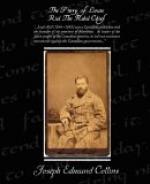Now, on the morning of Friday, the twenty-fourth of April, General Middleton, who was still on the march to Batoche’s, was riding with his staff, well in front. With him was Major Boulton’s Horse, who acted as scouts. As they were passing the two bluffs named, suddenly the crack of musketry rang out upon the prairie. Major Boulton now perceived that he had fallen into an ambush. At the same time that deadly balls and buck-shot came whistling and cutting spitefully through the air, there arose from both bluffs the most diabolical yelling. For miles over the silent prairies could these murderous yells be heard. Nor were the rebel balls fired without effect. Captain Gardner fell bleeding upon the ground, and several of the men had also fallen.
General Middleton, who had been some little distance in the rear was speedily apprised of the surprise, and dashing on toward the rebels’ hold he met Boulton’s Horse retiring for reinforcements. Then “A” Battery, the 90th regiment, and “C” Company, Toronto, with enthusiastic cheering, began to cry out: “Show us the rebels!”
In a little while the firing became general, and our men struck out extending their formation as they neared the edge of the coulee, from which puffs of smoke were already curling up. Twenty of Dumont’s men, with Winchesters, fired over a natural shelf or parapet protected by big boulders. The column was divided into two wings, the left consisting of “B” and “F” Companies of the 90th, with Boulton’s mounted corps, and the right of the rest of the 90th, “A” Battery, and “C” School of Infantry. The left wing, “F” company leading, came under fire first. As the men were passing by him; Gen. Middleton shouted out:
“Men of the 90th, don’t bend your heads; you will soon be there; go in, and I know you’ll do your duty.”
The men were bending down, partly to avoid the shots and partly because they were running over the uneven, scrubby ground. Colour-Sergeant Mitchell, of “F” company (one of the famous Wimbledon Mitchells), displayed great coolness, and afterwards did good execution with a rifle when the troops had entered the bush. “A,” “C,” and “D” Companies of the 90th, with “A” Battery and the School of Infantry, were on the right, the whole force forming a huge half-moon around the mouth of the coulee. The brush was densely thick, and as rain was falling, the smoke hung in clouds a few feet off the muzzles of the rifles.
Here the 90th lost heavily. Ferguson was the first to fall. The bandsmen came up and carried off the injured to the rear, where Dr. Whiteford and other surgeons had extemporized a small camp, the men being laid some on camp-stretchers and some on rude beds of branches and blankets. “E” company of the 90th, under Capt. Whitla, guarded the wounded and the ammunition. General Middleton appeared to be highly pleased with the bearing of the 90th as they pushed on, and repeatedly expressed his




